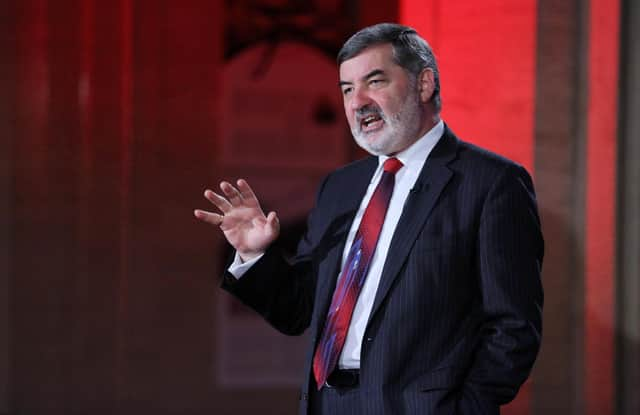Owen Polley: Unionists need to challenge the sort of thinking apparent in Lord Alderdice's comments on joint authority


In that scenario, ministers at Westminster would govern the province in consultation with their counterparts in Dublin.
The interview was prompted by an article called ‘All over bar the shoutin’’ that Alderdice published on his personal blog, implying that unionists were almost out of political options. The Liberal Democrat peer, who is now ensconced in Oxfordshire, also claimed that he would consider seriously the case for an all-Ireland state, if he was entitled to a vote in a constitutional referendum.
Advertisement
Hide AdAdvertisement
Hide AdHe thinks that Northern Ireland’s annexation is now a tempting prospect for the ‘third group’ in our society (i.e. those who do not consider themselves unionist or nationalist), because it offers the most direct route back into the EU. According to Alderdice, the attractions of the UK are dwindling rapidly, and he cited the example of the NHS to depict a society whose institutions are close to break-down.
In contrast, the DUP’s former deputy leader, Lord Dodds, described talk of joint authority as ‘irresponsible’. There were, indeed, many problems with Alderdice’s intervention and it understandably irritated unionists.
There is something inherently ridiculous, for example, in someone who enjoys a comfortable lifestyle in Oxfordshire – indeed whose entire immediate family is now apparently resident on the mainland – portraying the UK as a crumbling, failed state. It’s like a parody of the garment-rending mood of British liberals after Brexit. But while that mentality is harmless enough among well-heeled people in England, it’s proved dangerously destabilising in Northern Ireland.
If Alderdice were still living in Ballymena, rather than moving between the padded red benches of the House of Lords and shady cloisters at Oxford colleges, he would find it trickier to imply that our constitutional position can be picked, mixed and changed without repercussions.
Advertisement
Hide AdAdvertisement
Hide AdHe is, though, articulating accurately an attitude that is growing here. It’s almost as if this ‘third group’, exemplified by Alliance, has forgotten the combustible passions that questions of nationhood and sovereignty arouse.
Lord Dodds is right to point out that the Belfast Agreement makes no provision for joint authority and, in fact, specifically prevents the Republic’s interference in devolved issues.
Admittedly, Lord Alderdice predicted that decisions on our internal affairs would be taken ‘de facto’ in conjunction with Dublin, rather than through a formal arrangement. But he cited the British and Irish Intergovernmental Conference, which was set up under Strand Three of the Belfast Agreement and is not empowered to consider matters normally decided at Stormont.
The assertion that voters will be motivated by a potential route back into the EU is also difficult to justify. For several years, all kinds of politicians, including Alderdice’s former colleagues in Alliance, claimed that Northern Ireland could have ‘the best of both worlds’, through the backstop and then the protocol.
Advertisement
Hide AdAdvertisement
Hide AdIf this argument was made in earnest, rather than as a tactic to keep us tied to Brussels as closely as possible, why would anyone want to give up that privileged position? It’s a logical inconsistency that nationalists who use that line of thinking haven’t addressed, but it is equally relevant to disgruntled remainers who say they are now weighing the merits of an all-Ireland state.
In his radio interview, Lord Alderdice acknowledged that the campaign for a 32-county republic hasn’t yet explained what was on offer to those voters. At the same time, though, he lauded Mary-Lou McDonald’s claim that people here could still avail of British passports under a ‘new Ireland’, as if it were a significant concession.
The idea that access to UK documents is in Sinn Fein’s gift, or indeed that it will ever have anything to do with southern Irish politicians, is simply wrong. The Westminster government confers British citizenship and, whatever happens on this island constitutionally, it will remain its responsibility to determine who is entitled to UK passports.
This may seem like a trivial point, but why on earth would an experienced politician, like Alderdice, award points to Sinn Fein for making meaningless statements on issues that have nothing to do with the party and never will? In any case, the so-called offer of citizenship without a nation state, if anything, demonstrates the utter hollowness of theories that unionists could be accommodated in an Irish republican state.
Advertisement
Hide AdAdvertisement
Hide AdWhile there are all sorts of problems with Lord Alderdice’s predictions and his analysis, they should not be ignored. As this newspaper pointed out in an editorial last Thursday, the peer was the leader of the Alliance Party when it was explicitly pro-Union.
Through his remarks, he provided an insight into a way of thinking that is increasingly common. Unionists need to grapple with it effectively and refute it convincingly, if they are to do better in elections.
That means encouraging the belief that Northern Ireland’s place in the UK involves certainty, stability and the known, while constitutional change, even toward a hybrid state, creates the potential for political, economic and social chaos.
The atmosphere following the local government election has been overheated, with all sorts of speculation about Stormont and a border poll. Alderdice probably intended to help, by urging the DUP to return to the assembly, but his comments on joint authority added to the sense of volatility. They were ill-judged and unnecessary, but they highlight a mindset that unionism has to address.